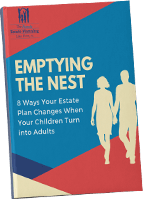
My father left a surprise when he died. It was traumatic.
We had no idea where to spread his ashes. Even if I knew to ask him, Alzheimer’s prevented him from having difficult conversations. How much was lost in translation? How much was actually him?
I thought his death would bring us peace. Instead, it weighed on us all for years.
So, I share with you advice I wish I’d gotten sooner.
Below are practical tips for difficult conversations about estate planning. As you prepare to talk with your aging parents, I offer you this support.
Before we get into the details, let’s make sure we’re on the same page about estate planning.
Why Estate Planning Matters
Estate planning is more than just drafting a Will. It’s about creating a comprehensive plan.
Your estate plan should give you peace of mind in life and establish your legacy in death. It should also include directives for healthcare and financial decisions if you’re incapacitated.
Here are some key reasons why every family needs an estate plan:
- Protecting Your Family: Ensures financial security for your loved ones and your wishes are clear.
- Avoiding Legal Complications: Reduces the risk of disputes and legal battles.
- Peace of Mind: Rest assured that your affairs are in order and your children will honor your legacy.
Despite its importance, many people still delay estate planning.
It’s a scary topic to address. Especially when you’re talking to parents who are nearing the end of their lives. I encourage you to face these fears head on.
Be open about your concerns. And know you’re taking a positive step towards a secure future for your family.
Talking to Your Aging Parents
Fair warning: this will be hard. There isn’t a magic, painless way to start.
This particular estate planning conversation is a rip-the-Band-Aid-off kind of conversation.
No matter your intentions or how well you prepare, there isn’t a way to know how this will affect you. So be kind to yourself. Before and after the talk.
Understand Their Material Wishes
You can start the conversation by expressing your concerns. You want to honor your parents’ wishes, after all. So, you’ll need their help to know exactly how to do that.
Then, turn it over to them by asking some open-ended questions. Bring to light any existing plans they may have.
An easy place to start are the material questions. For example:
How do you access their usernames and passwords?
What decisions have they made around financials?
What do they want to do with their stuff?
Where are their estate planning documents stored detailing their decisions?
How can you make sure their trust is properly funded, with all their assets accounted for?
These questions will help you build momentum. Your parents will find these questions easier to answer since they have to do with life. Life and living is familiar.
But death is unfamiliar. And uncomfortable. So, this next phase of the conversation will be harder.
What Happens After They Pass
Here’s where things start to get “real”. However your parents respond, these are no longer hypothetical answers.
Your mission is to understand, in detail, what happens when your parents actually do pass.
You’ll want to ask:
What are their wishes after they pass?
Do they wish for a burial or cremation?
What does that look like?
Considering the available resources, is that vision realistic? And if not, what alternatives are they ok with?
What do they want included in their obituary?
Who do they want to write their obituary?
How do they envision your family and community carrying on their legacy?
More specific questions will reveal themselves through your parents’ answers. Pay attention to how you feel and take breaks if necessary.
Don’t leave unturned cards on the table. And document everything.
Document Everything and Gather Information
Best-case scenario, your parents have a robust estate plan. What a pleasant surprise that would be!
No matter how extensive their formal plan, there’s a high chance something is missing. Or they’ve changed their mind about certain details.
Check off some essential documents, like:
Living Wills
Living Trusts
Power of Attorney Delegations
Healthcare Proxies
HIPAA Authorizations
These estate planning documents should be available at all times and updated regularly.
Quick Tip: NEVER store estate planning documents in a safe. They are useless locked away and may as well not exist. Instead, store them in a sturdy binder on a clean, accessible shelf.
Note any discrepancies during your conversation. Deal with them as soon as possible. Better now than after it’s too late and you’re stuck. Trust me, unenforceable wishes and transfers are much more of a headache.
Next, you’ll need to discuss their financial situation. Talk about their assets, debts, and insurance policies.
Talk through the structure of their trust, if they have one. For example, is it a revocable or irrevocable trust? Things get more complicated if they have an irrevocable trust. This is where you may want to involve an attorney.
Professional Help
Consider involving an estate planning attorney to provide expert advice and ensure all legal aspects are covered. This can also help in addressing any complex issues that may arise.

Download your emptying the nest guide today
Seeking Support from Friends
Your friends can be a valuable source of support and advice as you navigate estate planning.
Shared Experiences
Learn from friends who have gone through the estate planning process. Their experiences can provide valuable insights and practical tips.
Emotional Support
Lean on your friends for emotional support. Discussing estate planning can be stressful, and having a supportive network can make a significant difference.
Practical Advice
Exchange practical advice and resources with your friends. They may recommend helpful books, articles, or professionals they’ve worked with.
Tools and Resources
To help you get started, here are some tools and resources:
- Life Events Checklists: Use our life events checklists to ensure you stay on top of all essential aspects of estate planning.
- Professional Assistance: Our estate planning attorneys can provide expert guidance for you and your family.
- Educational Resources: Check out our free educational resources and sign up for our newsletter for further reading and understanding.
Take the Next Step
Discussing estate planning with your family may seem daunting, but it’s a crucial step towards ensuring your wishes are honored and your loved ones are cared for. By taking the time to have these conversations, you can achieve peace of mind and strengthen your family’s future. If you’re ready to take the next step, schedule a consultation with The Parents Estate Planning Law Firm. We’re here to support you every step of the way.
Remember, you’re not alone in this process. With the right tools and support, you can navigate estate planning with confidence and clarity.











